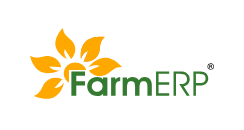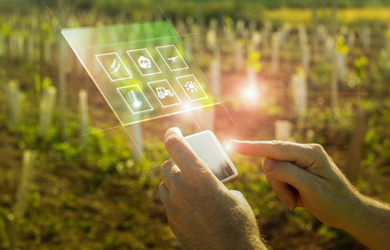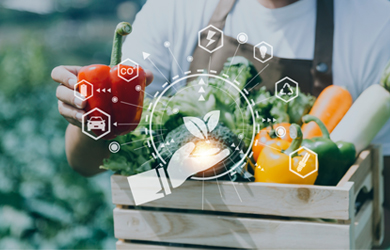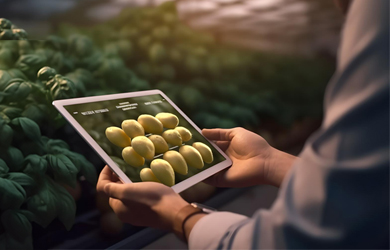Digital Technologies in Precision Farming: Imperative for a Bright Food Future
The food production practices have been significantly changing over the years. Especially with the new generation of tech-savvy agribusinesses, the use of innovative cultivation tools and technologies is becoming extremely common. That being said, the demand for food shows no sign of slowing down as the supply side continues to face challenges in farm management.
The world’s population is on track to reach 10 billion by 2050, according to the United Nations Environment Programme (UNEP), requiring a substantial increase in food availability for consumption. The economic and environmental impact of catastrophic weather events is contributing to the push for more ethical and sustainable farming practices.
In response to these food cultivation challenges, a promising production revolution has been making significant progress—precision agriculture. The adoption of various digital technologies in precision farming has been the key driving factor behind this revolution. These technologies also hold the promise of enhancing agriculture value chains to put agriculture back on a sustainable path.
Digital technologies in precision farming are set to push the future of food production to the next level, translating into increased yields at low costs. Read this blog as we explore the critical role of digital technologies in aiding precision farming and strengthening the agri sector.
Connectivity Between Operations: Key To Precision Agriculture
Precision agriculture uses a wide range of digital tools and data to generate insights that help farmers and agriculture companies make better decisions to improve efficiency, productivity, and sustainability. Accordingly, reliable connectivity across operations on farms and plantations is critical for the successful adoption and use of advanced digital technologies for precision farming. The real value of digital technologies in precision farming is to exponentially amplify the outcomes by keeping various farm functions connected, allowing data to flow seamlessly.
Agricultural Sensors Paving the Way for Data-driven Farming
The use of agricultural sensors in farms and equipment accounts for one of the key digital technologies in precision farming. They are deployed across modern farming tools and smart crop monitoring systems to continuously provide critical field data to farmers and producers. They can detect a wide range of metrics such as temperature, humidity, soil quality, etc to get a 360-degree view of the health of crops.
Sensors can assist in identifying weather conditions to make necessary changes in operations and mitigate the critical climate threats effectively. Similarly, sensors deployed to gather information from remote corners of the field, monitor soil conditions, etc can help farmers identify the low-performance areas easily. Consequently, producers can make well-informed decisions to carry out climate-smart agriculture practices.
ML Algorithms Driving Accurate Yield Predictions
Artificial intelligence (AI) and machine learning (ML) in agriculture are the pillars of modern farming practices. The advent of high-performance computing involving next-gen technologies such as machine learning is playing a key role today in encouraging smart and data-based farm decisions. This, in turn, is helping immensely in improving the productivity and sustainability of agricultural activities.
ML is enabling farmers and agribusinesses to extract knowledge from the collected data and build a framework for making intelligent predictions. It is being increasingly used to solve complex agricultural issues of weather prediction, pattern recognition, and disease identification. By assisting in the accurate estimation of various agricultural metrics, ML algorithms serve as one of the significant digital technologies for precision farming.
Agricultural Robots to Bring Speed and Accuracy in Repetitive Tasks
The use of digital technologies in precision farming has proven to be game-changing in many ways. Agricultural robots are playing a crucial role in speeding up various farming functions while also not compromising on the quality of operations. The use of robots can be helpful in automating numerous repetitive and tedious tasks in farming, thus lifting a heavy burden from the farmers’ shoulders.
With significant advancements in agriculture-specific digital technologies, precision farming is quickly becoming the new norm in the agricultural industry. This will not only reduce the dependency on farm labour but also help in eliminating the possibility of errors in farming operations. As a result, agribots will expedite various agricultural activities while also making these operations more value-driven and productive.
Agricultural Drones Set to Propel the Potential of Precision Agriculture
IoT-driven agriculture practices, involving unmanned aerial vehicles (UAVs) and agricultural drones have been garnering great attention in recent times due to their ability to assist in the farm processes. Leaping from the military and consumer use, drones are headed for the agriculture industry and changing the existing landscape of precision farming. With the ability to survey crops over vast areas to transfer real-time data to other connected equipment, agricultural drones are making a huge difference for the agri sector.
UAVs collect a large amount of farm data that can be used to make informed decisions in order to improve food production. This digital technology in precision farming, when used along with computer vision, can be useful in assessing field conditions and determining precise requirements of fertilisers, pesticides, etc. Drones can also be used to apply fertilisers in appropriate areas and quantities, thereby preventing the overuse or underutilisation of chemicals on crops.
Digital technologies in precision farming promise to be an effective way to step up sustainable production of food. These technologies are also creating routes for farmers to smartly utilise resources while driving greater value from their activities. Get in touch with us to know how FarmERP can assist you with tech-driven precision agriculture and can help you build resilient food production systems with improved access to data, knowledge, and markets.





